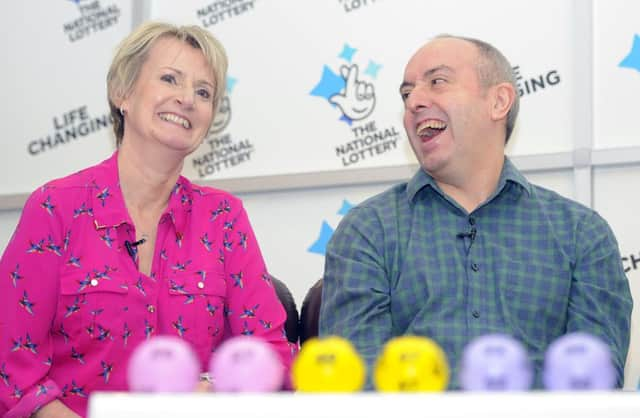Jane Bradley: Lottery has been part of Britain for 447 years


It was a tense time last Saturday night as Britain waited with bated breath to find out which of the tickets sold for the bumper rollover £66 million lottery jackpot would be victorious.
But as two lucky ticket holders – including Borders couple David and Carol Martin – watched their winning numbers emerge from the National Lottery’s ball machine, I hope they spared a thought for those who invested cash in the first ever lottery to be held on British soil.
Advertisement
Hide AdAdvertisement
Hide AdFor people who had bought a ticket for that lottery – a whopping 450 years ago – did not have a short wait before they discovered whether their gamble had paid off.
No, they were made to hold out three years to hear the result.
Monday marked the 447th anniversary of Britain’s first ever lottery draw, for which tickets had first been sold three years earlier, in 1566.
The delay, the monarch-backed organisers claimed, was due to logistical problems in selling the 400,000 tickets to prospective punters across the country. Presumably they didn’t realise how long it would take them, riding their ponies, to traverse an entire nation.
Poor excuse. Typical government attempt to hang on to your money if you ask me.
For in the meantime, the cash was held by the state, in what was basically an interest free loan of citizens’ money – and the poor, often poverty-stricken, punters could do nothing but sit on their hands.
Queen Elizabeth I was undoubtedly short of money to prop up her crumbling harbours and coastal defences. She had come to the throne eight years earlier, having inherited a debt of £227,000.
Her advisers claimed that it would be unseemly for her to go cap in hand to Europe to ask for more loans.
Advertisement
Hide AdAdvertisement
Hide AdAnother option was to raise taxes – not something she was too keen on, fearing she would anger her loyal subjects.
The answer was a lottery.
Yes, some of it – as today’s lottery does – was donated to good causes, the rest towards propping up state coffers. But, in a bid to help generate funds, the payment was not insignificant. A ten shilling fee was the equivalent of ten days work for a craftsman – equivalent to around £860 in today’s money, according to the average annual craftsman’s salary of £22,375 today, as listed on mysalary.co.uk.
Makes our modern day £2 a ticket charge – a 100 per cent hike on the £1 price when the lottery launched in 1994 – look incredibly reasonable.
As a result, most Elizabethans could not afford an entire ticket and went in with friends or business colleagues – or even bought a share in a ticket direct from brokers – a move which kicked off the stockbroking industry.
Unlike modern day gamblers, who watch the lottery drama unfold from the comfort of their cosy sofa, groups of hopeful ticket holders gathered for hours in the freezing cold at St Paul’s Cathedral – some of them presumably having travelled hundreds of miles from the frozen north – to watch a small child pull out each ticket one by one, with every ticket guaranteed to win a prize – however tiny.
Early ticket holders would also have to ensure they had good memories stretching back over the three year period – their winning ticket was identified not by their name, but by a “device” they chose to write on it: often a Bible quotation, verse of poetry or line explaining why the would-be winner would be worthy.
One example read: “God send a good lot for my children and me, which have had 20 by one wife truly.”
Twenty children? I’d give them the money, no questions asked.
Advertisement
Hide AdAdvertisement
Hide AdBut, sadly, the lottery didn’t attract the attention the Queen had hoped – unlike last week’s National Lottery draw, where the sheer demand crashed both the National Lottery’s website and Barclays’ Pingit app, which has a built-in function to purchase National Lottery tickets.
Between 1566 and 1569, palace employees had travelled the length and breadth of the country, erecting scrolls advertising the draw which depicted sketches of the prizes on offer, which as well as money, included silver plates and fabrics – as well as a jackpot of £5,000 – equivalent to £850,000 today.
Some accounts have claimed that other, more unorthodox, prizes on offer included free library access and even immunity from arrest for minor crimes for seven days.
Quite unlike today’s National Lottery ads, the latest of which starred Katie Price as a parody of her (even more) fame-hungry self, angling for a lottery win to allow her to launch her own TV station, KTV – accompanied by the slogan #PleaseNotThem? Presumably Elizabeth’s lottery workers couldn’t get contemporary stars Shakespeare – who was nowt but a toddler at the launch of the lottery – or Nostradamus to agree to the terms of an advertising contract.
And as it was, despite the fervent advertising attempts, only around 10 per cent of the total 400,000 tickets up for grabs were sold – and so the idea of a National Lottery was abandoned for the best part of another century, until a second attempt to create a nationwide state-sponsored gambling addiction took off and ran for 250 years until 1826, when moral questions were raised about its validity.
“Positively the last Lottery that will ever be drawn in England – 18 October” posters proclaimed that year.
Until 1994 that was of course, when we once again sank into the depths of organised gambling when Camelot took on the mantle of National Lottery operator – a decision which I’m certain Mr and Mrs Martin from Hawick – who are at this very minute likely to be clocking up £150 an hour interest on their £33m win – are undoubtedly very happy about.